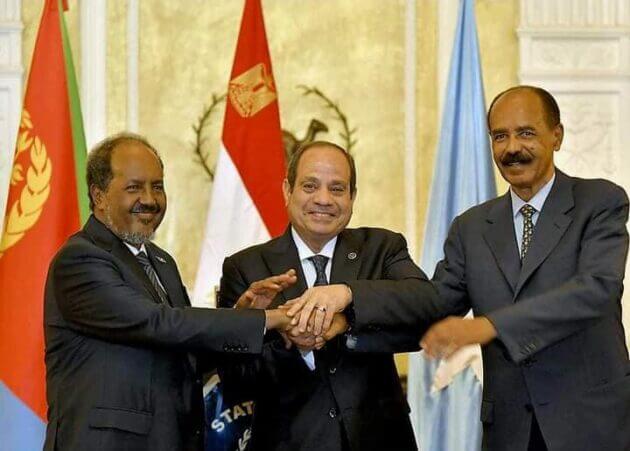|
LISTEN TO THIS THE AFRICANA VOICE ARTICLE NOW
Getting your Trinity Audio player ready...
|
In a high-stakes summit held in Asmara, the capital of Eritrea, Thursday October 10, leaders from Egypt, Somalia, and Eritrea came together to discuss regional cooperation, raising concerns over escalating tensions in the Horn of Africa.
The summit, which involved Egyptian President Abdul Fattah al-Sisi, Somali President Hassan Sheikh Mohamud, and Eritrean President Isaias Afwerki, has caught the attention of political observers due to the strained relations all three countries share with Ethiopia.
While the Eritrean statement following the summit emphasized “respect for the sovereignty and territorial integrity of the countries in the region,” there was no explicit mention of Ethiopia. However, analysts speculate that this could be a veiled reference to Ethiopia’s ambitions to gain access to a sea port, a goal that has further complicated its relations with neighboring countries. As Ethiopia remains landlocked, its desire for a maritime outlet is seen as a potential flashpoint in the region.
Tensions between Somalia and Ethiopia have been on the rise recently, particularly after Ethiopia’s controversial agreement with Somaliland—a self-declared republic that Somalia views as part of its territory—to lease a section of its coastline. This move has left Mogadishu furious, especially given Ethiopia’s historical support for Somalia in its fight against al-Shabaab, a militant group with ties to al-Qaeda. Ethiopia’s long-standing backing of the Somali government in the fight against terrorism now seems to be under strain.
Egypt and Ethiopia have also been at odds for more than a decade over the construction of the Grand Ethiopian Renaissance Dam (GERD) on the River Nile. Egypt, which depends on the Nile for the majority of its water supply, views the dam as a direct threat to its water security. This long-standing dispute between the two nations has created a rift, further complicating diplomatic relations in the region. Recently, Egypt’s growing military support for Somalia, marked by arms shipments and joint military exercises, has added another layer of complexity to these regional alliances.
However, Somalia’s Information Minister, Daud Aweis, rejected claims that the summit was intended to target Ethiopia. In an interview with BBC, Aweis explained that the discussions focused solely on cooperation between Egypt, Somalia, and Eritrea, dismissing suggestions of a coordinated stance against Addis Ababa. “We are not determined to instigate anything against Addis Ababa,” Aweis said. “We stand for peace and don’t believe the meeting in Asmara has anything to do with Ethiopia.”
Despite these reassurances, the photograph released following the meeting—showing Presidents Afwerki, Sisi, and Mohamud clasping hands—symbolizes a deepening partnership between the three countries. The official statement indicated a commitment to bolstering Somalia’s state institutions, particularly in enhancing the capacity of its federal army to confront terrorism.
This marked President Sisi’s first visit to Asmara, a significant move given the strained relations between Egypt and Ethiopia. Somalia’s President Mohamud, in contrast, has visited Eritrea three times this year, signaling a closer relationship between Mogadishu and Asmara.
Eritrea’s own relationship with Ethiopia has seen a rollercoaster of developments. Following a brutal border war in the late 1990s, relations between the two nations were at a standstill for nearly two decades. In 2018, hopes were high when Ethiopian Prime Minister Abiy Ahmed signed a “declaration of peace and friendship” with Eritrea, ending years of hostilities and earning Abiy the Nobel Peace Prize in 2019. However, the close ties forged during this period have since deteriorated.
Eritrea was a key ally to the Ethiopian government during the two-year civil war in the Tigray region, which shares a border with Eritrea. Although Asmara played a pivotal role in supporting Ethiopia during the conflict, it has been notably less enthusiastic about the peace accord that ended the fighting in November 2022. Relations between the two nations have worsened, especially after Prime Minister Abiy declared Ethiopia’s interest in securing access to a Red Sea port, a move that has caused further friction with Eritrea.











LEAVE A COMMENT
You must be logged in to post a comment.